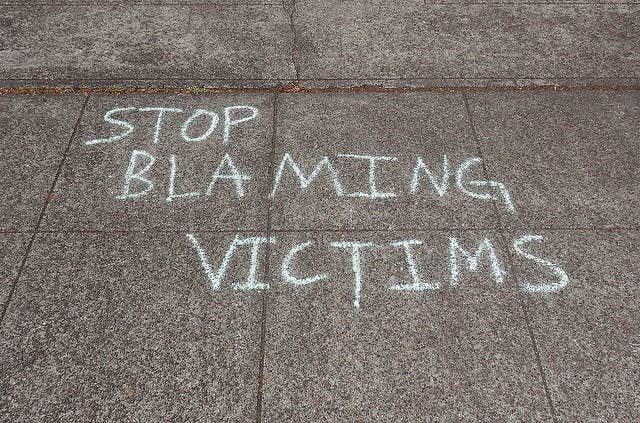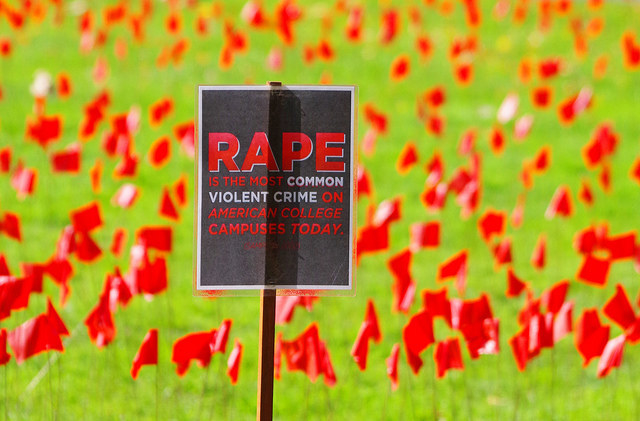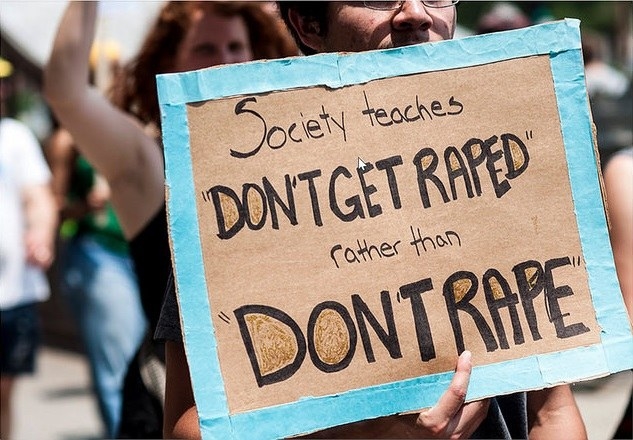Warning: Contains graphic descriptions of assault that may be triggering.
It was the summer before I started graduate school. I was visiting a former professor who happened to get drunk one night. In the late hours of the night, I was saddled with the job of driving him home as he screamed at me about leading him on. I had no means of getting home once I dropped him off and spent the night on the couch adjacent to his.
Around five in the morning, he climbed onto my couch and slipped a hand down my pants. I told him no once, twice, maybe three times. He groped me, spoke dirty, kissed my neck. Sometimes he listened when I said no, mostly he didn’t. After a while, I lay there.
There was no penetration involved, but after I left later that morning, I contacted my best friend. “I just feel gross,” I said to one of them. Later that day when talking on the phone with my boss, I broke down crying.
This particular professor taught writing courses at my undergraduate institution. He was well-liked by most students. He has a 4.4 on RateMyProfessor, and some of his top tags include "hilarious", "respected", and "inspirational." During class, he pointed out sexism and racism in the texts and in the students and even made sure to periodically check in with the class to remind them of the mental health resources available on campus.
A week before he assaulted me, after a series of (too) personal conversations, he pressed me to discover that I had a crush on him. His response was to tell me that he reciprocated it but never voiced it because he thought I was a lesbian. I made my boundaries clear, yet he kept on persisting, and little by little, I gave in. After he assaulted me, I remember asking my friend through tears, “Is it my fault?”

Sexual harassment in academia is not a new thing, but it is not often discussed. However, post-Harvey Weinstein, conversations that have otherwise remained buried are making their way to the forefront of the cultural conversation. In October, Caroline Fredrickson published her piece When Will the “Harvey Effect” Reach Academia? in The Atlantic. A few days later, K.A. Amienne published Abusers and Enablers in Faculty Culture in The Chronicle for Higher Education. At the end of November, Irene Hsu and Rachel Stone shared their personal accounts in The New Republic in their moving and horrifying joint-essay A Professor Is Kind of Like a Priest. And finally, Sheila McMillen posted an article on culture of sexual harassment in academia in The Chronicle for Higher Education titled Dirty Old Men on the Faculty.
On her website, The Professor Is In, Dr. Karen Kelsky, conducted a crowdsourced survey of sexual harassment in academia. In a statement on her Facebook, Dr. Kelsky said, “I created the survey to give victims a place to share their stories, to know they are not alone and to realize the systemic, institutional, and patterned nature of sexual abuse in the academy.” In just a week, she has collected over 1,500 submissions.
So why have we not talked about this yet?

As many of the aforementioned articles discuss, the old adage “boys will be boys” has become a shield for many professors. And as it has been revealed for Hollywood as accusations pile up, academia has purposefully created a culture of silence. In fact, the academy benefits from this silence.
For one, institutions do not want to take the blame for hiring someone who has assaulted or harassed women (or anyone for that matter). In some cases, institutions have knowledge of a professor’s record of sexual misconduct prior to hiring them. Yet many institutions turn a blind eye in order to gain a prestigious or well-respected faculty member. Yet even when an institution has no knowledge of a professor’s record and is confronted with it for the first time, they choose to stay silent out of fear that it would reflect poorly on them to have placed someone in a position of power who proceeded to abuse it. Tyler Kingskade of Buzzfeed describes how many institutions keep knowledge of sexual harassment under wraps even in circumstances where the professor has been fired. Some institutions do not take the claims seriously and/or even refuse to fire their faculty, especially if they have tenure.
In some ways, the question institutions seem to be asking is: do we choose to protect students or (abusive) scholars who are the top in their field? By choosing the latter to keep their image intact, colleges and universities rely on the students’ silence.
Unfortunately, the very structure of academia is conducive to empowering abusers. Although it is unspoken and even denied, there is a built-in system of power that professors have over their students. Students turn to professors to guide them. They see them as mentors and entrust them with their well-beings and their futures. As ready as many are to deny it, sharing your thoughts and vulnerabilities to a professor is an intimate experience. Tack on the question of financial debt (as many have by pursuing higher education), and it gets even more complicated.
And just like with every space, there are people who are eager to take advantage of this relationship.
Harassment can come in a variety of forms, as Dr. Kelsky’s survey has proved. In that spreadsheet alone, it ranges from purposefully gaslighting to lewd comments, from threats to assault, from sabotaging their academic future to emotional abuse. Even after graduation, questions of debt and gratitude can be used to manipulate former students. Still, in each instance, this abuse of power is often left unchecked.
Yet what can be expected of institutions that refuse to value women and men equally, even among the faculty? A fact sheet in the National Center for Educational Statistics from 2015 shows that despite the near-even divide between men and women as total faculty members, men highly outweighed women in positions of as full-time professors (around 70% male and 30% female). They somewhat outweighed women in positions as associate professors. The assistant professors marked the shift from being male-dominated to becoming female-dominated. Instructors and lecturers (much lower-ranking positions) were hugely female-dominated. (The truly horrendous divide between white faculty and non-white faculty cannot be ignored either.)

Students should not be left in positions where they cannot be vocal about harassment without worry that they will not get support or that their privacy throughout the matter will be disrespected. As long as those who hold power within these colleges and universities continue to protect other members of the faculty, students will continue to suffer the effects of preventable trauma.
This silence places the onus on the student to make the decision whether to endure the professor's abuse or take actions to avoid it. When a student chooses to silently suffer because a system that was supposed to protect them failed to do so, it only sends the message to an abuser that they can continue to get away with their actions. It has the potential to embolden them to behave worse toward the student in question or to expand to multiple students. If a student chooses to leave, they are forfeiting not only their academic (and opportunity at general) careers, they are abandoning a community of friends and support that they built.
More needs to be done to ensure students’ safety. Those in power cannot stand to the side while their colleague continue to abuse the system. Heads of department, deans, and those in charge cannot continue to choose the reputation of their college or university over the students’ safety. Higher education strives to teach students to dismantle systems of oppression. How can they make such a claim if they refuse to follow those very guidelines?

